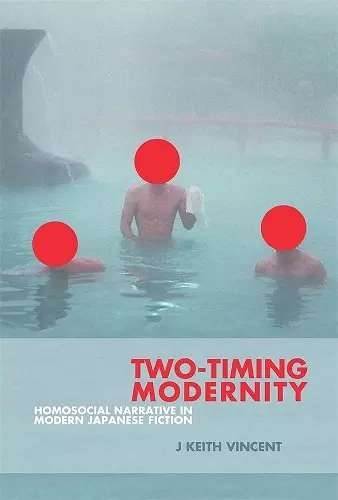Two-Timing Modernity
Homosocial Narrative in Modern Japanese Fiction
Format:Hardback
Publisher:Harvard University, Asia Center
Published:19th Dec '12
Currently unavailable, and unfortunately no date known when it will be back

Keith Vincent creatively illuminates the narrative structures, reading practices, and cultural assumptions through which key Japanese texts from the first half of the twentieth century articulate the close proximity of historical and developmental understandings of male-male desire to modern formulations of homosociality. Meticulously researched and rigorously argued, Two-Timing Modernity is a most welcome contribution to the field. -- James Reichert, Stanford University In this absorbing study, Keith Vincent brings insight into the split of homosociality and heteronormativity imposed on the nation-state and the individual in modern Japan, demonstrating that sexuality is not only subject matter for literary narratives but that it also defines and is defined by the rhetoric of narration. Engaging the reader in careful rethinking of how these texts have been read-and how they should be read now-Vincent's book will resonate with a broad audience, making indelible marks in the fields of narrative studies, queer theory, and modern Japanese literature. -- Atsuko Sakaki, University of Toronto Two-Timing Modernity sets a new standard for innovative engagement with queer theory in Japanese literary studies. At the same time, this work reminds us that established approaches in literary studies such as narratology and 'good old' close reading still serve as great tools for cutting-edge scholarship. -- Tomiko Yoda, Harvard University
Two-Timing Modernity integrates queer, feminist, and narratological approaches to show how key works by Japanese male authors in the early twentieth century encompassed both a straight future and a queer past by staging tensions between Japan’s newly heteronormative culture and the recent memory of a male homosocial past now read as perverse.
Until the late nineteenth century, Japan could boast of an elaborate cultural tradition surrounding the love and desire that men felt for other men. By the first years of the twentieth century, however, as heterosexuality became associated with an enlightened modernity, love between men was increasingly branded as “feudal” or immature. The resulting rupture in what has been called the “male homosocial continuum” constitutes one of the most significant markers of Japan’s entrance into modernity. And yet, just as early Japanese modernity often seemed haunted by remnants of the premodern past, the nation’s newly heteronormative culture was unable and perhaps unwilling to expunge completely the recent memory of a male homosocial past now read as perverse.
Two-Timing Modernity integrates queer, feminist, and narratological approaches to show how key works by Japanese male authors—Mori Ōgai, Natsume Sōseki, Hamao Shirō, and Mishima Yukio—encompassed both a straight future and a queer past by employing new narrative techniques to stage tensions between two forms of temporality: the forward-looking time of modernization and normative development, and the “perverse” time of nostalgia, recursion, and repetition.
Offering incisive textual analyses of homosociality in the texts of three canonical writers (Mori Ogai, Natsume Soseki, and Mishima Yukio) and one relatively unknown writer (Hamao Shiro), Vincent examines the male homosocial continuum in Japanese fiction, exploring the way male–male relationships in the novels under discussion have been relegated to a historical and narrative past where they persist in the ‘amber of memory.’ …Vincent’s study is unique in its careful articulation of the interface between the homosexual and the homosocial and the interaction both have with feminist theories and queer studies. What is perhaps even more significant, however, is the way Vincent reads the temporality of homosexual desire in both extratextual historical contexts and the intertextual narrative structure. In so doing, he shifts the focus of his argument from a general critique of culture to close textual readings. Here his literary analyses are astute, linguistically deft, and original. This is a path breaking work that will be an important resource for scholars of literature and sexuality. -- R. L. Copeland * Choice *
Keith Vincent creatively illuminates the narrative structures, reading practices, and cultural assumptions through which key Japanese texts from the first half of the twentieth century articulate the close proximity of historical and developmental understandings of male–male desire to modern formulations of homosociality. Meticulously researched and rigorously argued, Two-Timing Modernity is a most welcome contribution to the field. -- James Reichert, Stanford University
In this absorbing study, Keith Vincent brings insight into the split of homosociality and heteronormativity imposed on the nation-state and the individual in modern Japan, demonstrating that sexuality is not only subject matter for literary narratives but that it also defines and is defined by the rhetoric of narration. Engaging the reader in careful rethinking of how these texts have been read—and how they should be read now—Vincent’s book will resonate with a broad audience, making indelible marks in the fields of narrative studies, queer theory, and modern Japanese literature. -- Atsuko Sakaki, University of Toronto
Two-Timing Modernity sets a new standard for innovative engagement with queer theory in Japanese literary studies. At the same time, this work reminds us that established approaches in literary studies such as narratology and ‘good old’ close reading still serve as great tools for cutting-edge scholarship. -- Tomiko Yoda, Harvard University
- Nominated for John Whitney Hall Book Prize 2014
ISBN: 9780674067127
Dimensions: 229mm x 152mm x 25mm
Weight: 522g
248 pages